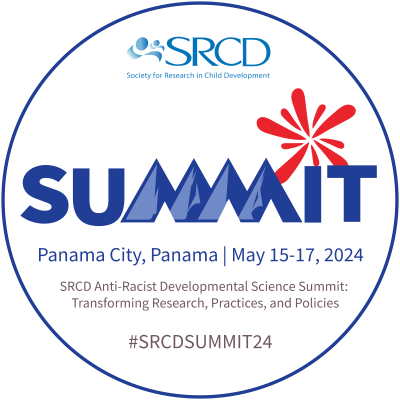Strengthening Connections Among Child and Family Research, Policy and Practice
As part of its initiative to host small, focused topical meetings during the off-years from its Biennial Meeting, the Society for Research in Child Development (SRCD), along with Program Co-Chairs, Elizabeth Gershoff and Aletha Huston, and the Committee for Policy and Communications, invite you to attend the conference on Strengthening Connections among Child and Family Research, Policy and Practice, to be held at the Hilton Alexandria Old Town, Alexandria, VA, April 3 – 5, 2014. The meeting attendance will be capped at 225 people, so register early!
The goal of the Strengthening Connections conference is to promote multidirectional communication among researchers and those who apply developmental science in policy and practice. The conference is an opportunity for researchers and their partners in program and policy environments to share their successes in and barriers to the conduct of policy-relevant research on one hand and the creation of research-based policies and programs on the other.
Invited Program
Keynote Speakers
Opening Plenary
Driving Science-Based Innovation that Achieves Breakthrough Outcomes for Children Facing Adversity
Keynote Speaker: Jack Shonkoff
Abstract: This session will explore how recent advances in neuroscience, molecular biology, and epigenetics can help launch a new era in policy and practice driven by science as “a different way of knowing” and innovation as “a different way of working.” Participants will discuss how enhanced understanding of the lifelong consequences of early adversity linked to creative investments in strengthening the capabilities of the adults who care for young children can inform new theories of change, testable hypotheses, and more effective intervention strategies for reducing intergenerational poverty.
Biography: Jack P. Shonkoff, M.D., is the Julius B. Richmond FAMRI Professor of Child Health and Development at the Harvard School of Public Health and the Harvard Graduate School of Education; Professor of Pediatrics at Harvard Medical School and Boston Children’s Hospital; and Director of the university-wide Center on the Developing Child at Harvard University. He currently serves as chair of the National Scientific Council on the Developing Child, a multi-university collaboration comprising leading scholars in neuroscience, psychology, pediatrics, and economics, whose mission is to bring credible science to bear on public policy affecting young children. In 2011, Dr. Shonkoff launched Frontiers of Innovation, a multi-sectoral collaboration among researchers, practitioners, policymakers, investors, and experts in systems change who are committed to developing more effective intervention strategies to catalyze breakthrough impacts on the development and health of young children and families experiencing significant adversity.
Under the auspices of the National Academy of Sciences, Dr. Shonkoff served as Chair of the Board on Children, Youth, and Families and chaired a blue-ribbon committee that produced the landmark report, From Neurons to Neighborhoods: The Science of Early Childhood Development. He also served as a member of the Panel on Child Care Policy, the Committee on the Assessment of Family Violence Interventions, and the Roundtable on Head Start Research.
Dr. Shonkoff has received multiple honors, including elected membership to the Institute of Medicine of the National Academy of Sciences, elected membership to the American Pediatric Society, designated National Associate of the National Academies, the C. Anderson Aldrich Award in Child Development from the American Academy of Pediatrics, and the Award for Distinguished Contributions to Public Policy for Children from the Society for Research in Child Development.
Dr. Shonkoff has served on numerous professional networks and public interest advisory boards, including the core scientific group of the MacArthur Research Network on Early Experience and Brain Development, the Governing Council of the Society for Research in Child Development, and the Executive Committee of the Section on Developmental and Behavioral Pediatrics of the American Academy of Pediatrics. He has authored more than 150 publications, including nine books; co-edited two editions of the widely heralded Handbook of Early Childhood Intervention; and served on the editorial board of several scholarly journals, including Child Development.
Dr. Shonkoff completed his undergraduate studies at Cornell University, medical education at New York University School of Medicine, pediatric training at Bronx Municipal Hospital Center and the Albert Einstein College of Medicine, and fellowship in developmental pediatrics at Harvard Medical School and Boston Children's Hospital. He has been a visiting professor or delivered named lectureships at more than 30 universities in the United States, Australia, Brazil, Canada, China, Israel, Japan, Mexico, Puerto Rico, Turkey, and the United Kingdom. Prior to assuming his current position, he was the Samuel F. and Rose B. Gingold Professor of Human Development and Social Policy and Dean of The Heller School for Social Policy and Management at Brandeis University.
Striving to Make Child Welfare an Evidence-based Intervention
Keynote Speaker: Bryan Samuels
Abstract: Recent advances in our knowledge of the effects of complex trauma on children and youth have generated an opportunity to make crucial strides in reforming our child welfare services. Using evidence-based screening, assessment and intervention to promote the well-being of youth and children (as evidenced by indicators of normal childhood development) must be a central focus of the work of and investments by public and private child welfare agencies and organizations.
Biography: Bryan Samuels is the Executive Director of Chapin Hall, one of the nation’s leading research and policy centers focused on improving the well-being of children and youth, families, and their communities. Before joining Chapin Hall, Samuels was appointed by President Barack Obama as Commissioner of the Administration on Children, Youth, and Families (ACYF), making him from 2010-2013 the highest-ranking federal child welfare policymaker in the country. As ACYF Commissioner, he emphasized the importance of child well-being and the use of data-driven approaches to improve the welfare of vulnerable children and youth. Samuels has over twenty years of experience in child welfare, including having served as the Chief of Staff of Chicago Public Schools under Arne Duncan and as Director of the Illinois Department of Children and Family Services. He was also a lecturer at the University of Chicago’s School of Social Service Administration from 1997 to 2003. He has a bachelor’s degree in economics from the University of Notre Dame and a master’s from the University of Chicago Harris School of Public Policy.
Social Science Rising: Obama's Evidence-Based Initiatives
Keynote Speaker: Ron Haskins
Abstract: The Obama administration is attempting to shift the primary basis of federal funding of social intervention programs so that funds will be spent primarily on programs that have evidence of impacts from rigorous evaluations. The talk will review six evidence-based initiatives of this type with attention to how the administration rallied congressional support for the initiatives, defined what it means to be evidence-based, designed the funding processes followed by five federal agencies to ensure that money went to programs with strong evidence of impacts, and ensured that all funded programs would be evaluated with rigorous designs. The talk will also consider the prospects that the Obama approach will increase the average impacts of social intervention programs and, even more broadly, will shape the future use of evidence from program evaluations by federal agencies, school systems, community-based agencies, foundations, and other organizations that fund or operate social intervention programs.
Biography: Ron Haskins is a Senior Fellow in Economic Studies at the Brookings Institution, where he co-directs both the Center on Children and Families and the Budgeting for National Priorities Project. He is also a senior consultant at the Annie E. Casey Foundation. He is also a Senior Consultant at the Annie E. Casey Foundation. He is the author of Work Over Welfare: The Inside Story of the 1996 Welfare Reform Law (2006), co-author of Creating an Opportunity Society (2009), and Senior Editor of The Future of Children. In 2002 he was the Senior Advisor to the President for Welfare Policy at the White House. Prior to joining Brookings and Casey he spent 14 years on the staff of the House Ways and Means Human Resources Subcommittee, serving as the subcommittee’s Staff Director after Republicans took control of the House in 1994. In 1997, Haskins was selected by the National Journal as one of the 100 most influential people in the federal government. He holds a Ph.D. in Developmental Psychology from UNC.
Scenic routes and short cuts between developmental science in the north and child policy in the south
Keynote Speaker: Linda Richter
Abstract: Almost all scientific knowledge about children’s development, as well as about interventions to protect and promote child development, is generated in high-income countries in the north, most notably the United States (Tomlinson & Swartz, 2003). But policy need and demand from poor countries is high, including with respect to investments to support children’s health, education and wellbeing. It’s important that low- and middle-income countries spend what funds they have wisely and that the money and effort achieves impact. Using children affected by HIV in southern Africa as a point of reference, I examine the applicability of available child development science, how contexts affect the research questions asked, the growing global market for policy research, the kind of information that governments heavily affected by HIV find useful, and how the scientific community working in the field of child development can better serve children across the globe. Essential to making child development knowledge more globally useful is a better sense of what we can and can’t feel confident about.
Biography: Professor Linda Richter (PhD) is a Distinguished Research Fellow at the Human Sciences Research Council in South Africa. She is an Honorary Professor in Psychology and an elected Fellow of the University of KwaZulu-Natal; an Honorary Professor in the Department of Paediatrics and Child Health at the University of the Witwatersrand, and a Research Associate in the Department of Psychiatry at the University of Oxford (UK). From 2003-2006, she was a Visiting Researcher at the University of Melbourne, and from 2007-2010 a Visiting Scholar at Harvard University (USA). From 2010-2012 she was on a two-year contract from the Human Sciences Research Council to the Global Fund to Fight AIDS, Tuberculosis and Malaria in Geneva, as Senior Specialist (Health of Vulnerable Children) for half of her time.
Linda has conducted both basic and policy research in the fields of child, youth and family development as applied to health, education, welfare and social development, and has published more than a 350 papers and chapters in the fields of child, adolescent and family development, infant and child assessment, undernutrition, street and working children, and the effects of HIV and AIDS on children and families. She is the Principal Investigator of several large-scale, long-term collaborative projects, including Birth to Twenty, a Wellcome Trust-funded birth cohort study of 3 273 children with follow up to age 23 years, and the Consortium of Health Oriented Research in Transitioning Societies (COHORTS), a network of birth cohort studies in low and middle income countries. She is a member of the PEPFAR Scientific Advisory Committee and in 2012 she served on the evaluation team to review PEPFAR’s programmes for orphans and vulnerable children in 26 countries. She is currently leading a Monitoring, Evaluation and Learning initiative for 14 international organizations funded by the Conrad N Hilton Foundation to support the development of young children in high HIV prevalence communities in southern and eastern Africa.
Closing Plenary
Integrating Neurobiological and Environmental Conceptions of Risk to Inform Policy
Keynote Speaker: Deborah A. Phillips
Abstract: This presentation will make the case for strengthening connections between neurobiological and environmental perspectives on risk and protection to inform next stage developmental interventions. It will address the need to deploy more dynamic models of both risk and protection, to draw together work on the biological embedding of stress and the negative impacts of income inequality, and to integrate the early intervention literature focused on children with special needs and that focused on children in poverty. Challenges posed by this perspective to issues of eligibility, developmental equity in public investments, and intervention design and evaluation will be discussed. Specific attention will be paid to the need for both research and policy to view early and primary education settings as bases of security as well as engines of opportunity.
Biography: Deborah Phillips is Professor of Psychology and Associated Faculty in the Public Policy Institute at Georgetown University. She was the first Executive Director of the Board on Children, Youth, and Families of the National Research Council and the Institute of Medicine and served as Study Director for the Board’s report: From Neurons to Neighborhoods. The Science of Early Child Development. She also served as President of the Foundation for Child Development, Director of Child Care Information Services at the National Association for the Education of Young Children, and Congressional Science Fellow (Society for Research in Child Development) on the staff of Congressman George Miller. Her research focuses on the developmental effects of early childhood programs for both typically developing children and those with special needs, including research on child care, Head Start, and pre-Kindergarten programs. Deborah has served on numerous task forces and advisory groups that address child and family policy issues, including the Task Force on Meeting the Needs of Young Children of the Carnegie Corporation of New York, the National Scientific Council on the Developing Child, the Head Start FACES Redesign Expert Panel, and the Secretary’s (US DHHS) Committee on the Maternal, Infant, and Early Childhood Home Visiting Evaluation. Dr. Phillips is a Fellow of the American Psychological Association, the Eastern Psychological Association, and the American Psychological Society. In 2011, she received the Distinguished Contributions to Education in Child Development Award from the Society for Research in Child Development.
Invited Sessions
Session A: How Research is Used in Education Policy and Practice
Chair: Vivian Tseng, William T. Grant Foundation
Participants:
- Cynthia Coburn, University of California, Berkeley
- Janelle Scott, University of California, Berkeley
- John Easton, Institute of Educational Sciences
Session B: The Roles of Government in Promoting Policy-Relevant Research
Chair: Valerie Maholmes, Pediatric Trauma and Critical Illness Branch, NICHD
Participants:
- Catherine Nolan, Children’s Bureau, Administration for Children and Families, DHHS
- Gillian Huebner-Utterwulghe, USAID
- Frances Ashe-Goins, Office of Women’s Health, DHHS
- Martha Moorehouse, Office of the Assistant Secretary for Planning and Evaluation, DHHS
- Kim Boller, Mathematica Policy Research
Session C: Career Paths in Policy Research
Chair: Matthew Stagner, Mathematica Policy Research
Participants:
- Rebekah Levine Coley, Boston College
- Jenni Owen, University-Based Child and Family Policy Consortium and Center for Child and Family Policy, Duke University
- Maria Woolverton, Office of Planning, Research, and Evaluation, DHHS
- Edward Metz, Institute of Education Sciences
Session D: International Research-Policy Collaborations
Chair: Pia Britto, Child Study Center, Yale University
Participants:
- Hirokazu Yoshikawa, New York University
- June Lee, Sesame Workshop
- Joost de Laat, World Bank
Session E: Translating Research to Journalists, Policymakers, and Practitioners
Chair: Lisa Guernsey
Participants:
- Brian Wilcox, University of Nebraska-Lincoln
- Martha Zaslow, SRCD Office for Policy and Communications
- Annie Murphy Paul, author/journalist
Session F: Methods of Policy Relevant Research – Issues of Rigor and Feasibility
Chair: Aletha Huston, University of Texas at Austin
Participants:
- Matthew Stagner, Mathematica Policy Research
- Pamela A. Morris, New York University
- Lynn Karoly, RAND Corporation
- Julie Kerksick, Office of Economic Security, Colorado Department of Human Services
- Greg J. Duncan, University of California at Irvine


